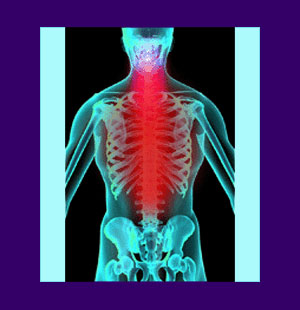
A sore back is a common patient complaint which typically describes a dull achy feeling in the back muscles or a general feeling of all-over discomfort in the dorsal region. The usual cause of soreness in the soft tissues is simple overexertion, which can result from long hours of manual labor or repetitive strain conditions.
Soreness is usually defined as a dull, achy throbbing or pounding pain in larger areas of the muscular back anatomy. The symptom might be constant or might be worsened through certain ranges of motion. Back muscle pain can be very intense at times, but is almost never cause for alarm. The vast majority of muscular complaints will resolve all by themselves and should not require any special medical treatment. Symptoms which are acute or neurological in nature may be indicators of a more serious back pain problem and should be reported to your doctor if they continue or worsen.
This report examines the common circumstances that lead to soreness in the back and spine.
Sore Back Treatment
Muscular back pain is the most commonly experienced form of dorsalgia. Although back muscle pain can be miserable to endure, the chances of it becoming chronic are very low. Pain in the back muscles almost always is sourced by overwork, including the associated lactic acid buildup and small muscular tears that are inherent to prolong periods of intense muscular exertion. This back muscle strain can really hurt horribly, but will often resolve with application of some of the following simple home remedies:
For severe muscular pain, use ice for the first 24 hours and then switch to heat for the following 24 to 48 hours. For minor soreness, ice for the first 12 hours, then switch to heat. Apply 20 minutes on and 1 hour off. Warm heat works particularly well.
Massage can help relieve overworked muscles quickly, by speeding up the process which metabolizes lactic acid that is stored in soft tissues. Massage also encourages oxygenation of sore tissues.
OTC pain management is a pharmaceutical therapy option for those who just can’t stand the misery of nagging back ache. However, even OTC products still demonstrate significant health risks when used in certain circumstances, such as with alcohol, with other drugs or for an extended timeframe.
When is Back Soreness Serious?
Serious back pain, which is not due to an obvious source, should be grounds for a medical consultation. If you are aware of an injury to the area, the extent of damage may be greater than first thought and diagnostic imaging may be appropriate to check for fractured vertebrae or herniated discs.
Symptoms that exist along with seemingly unrelated health conditions, such as fever, all-over achiness or nausea, may be part of a larger infectious or viral process.
Chronic pain conditions often indicate the existence of a physical or psychological mechanism which is causing a recurrence or perpetuation of the painful symptoms. Most minor injuries will heal in a matter of days or weeks. More serious spinal conditions might require professional care from a qualified physician.
For patients who have attempted a variety of treatment options, but still experience recurrent pain, there is a good chance that their agony is actually the result of a mindbody condition. Soreness can result from chronic back muscle tension or ongoing issues with tight back muscles. In these cases, any structural diagnosis made will only hurt the patient, since they will likely begin treatment for a coincidental issue that is not responsible for the pain.
Chronic psychogenic ischemia is often the underlying causative process in these scenarios. Luckily, the problem can usually be effectively treated with some basic alternative medicine practices.
Sore Back Recovery Tips
Worry will definitely make any painful health condition worse. You must be confident that your body is fully capable of healing itself and should concentrate on achieving a full recovery from any minor injury. Staying relaxed and focusing the mind on a positive goal will help facilitate healing for virtually any symptomatic condition.
Remember, any part of your anatomy can become sore for known or idiopathic reasons. If the pain is not too severe, there is unlikely to be any cause for alarm. This is especially true if the symptoms are easily attributable to some form of recent overexertion, such as snow removal, garden work, lifting or working-out.
If your soreness becomes worse, instead of better, or continues for an extended time, you must see a doctor to make sure there is nothing seriously wrong with your back.





